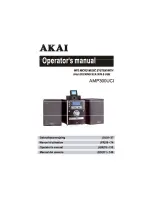
Wireless System Trouble Shooting
If you happen to encounter any problems while using your wireless system, it’s recommended that this
trouble shooting section is checked to see if a solution can be found. If none of the suggested solutions
included below solve your particular problem, please contact your local retailer for further advice.
This trouble shooting section includes all of the most common possible issues and is not a complete list of
every possible fault, defect, and their subsequent solution. This section is generally focussed on solving
problems regarding the use of wireless systems. It may be that some of the included problems, causes, and
solutions do not apply to your situation since product specifications can differ.
Problem
Common cause
Solution
Transmitter is not switching
on
Power socket not active
Check that the mains power socket is
active, especially if it is (for example) a
power block with a switch or a power
switching system fitted with power sockets.
Power supply is not securely
connected
Check that the power supply is securely
connected to the receiver and that the plug
is securely connected to an active mains
power supply socket.
Power button has not been
pressed
Make sure that the power button of the
transmitter has been pressed.
Receiver is not switching on No batteries
Check that batteries have been installed in
the battery compartment.
Batteries incorrectly installed
It might be that the batteries have been
installed the wrong way around. Always
ensure that the batteries are installed so
that the polarity (+/-) matches the polarity
indicated in the compartment.
Batteries empty/low
Replace the batteries with new, high-quality
batteries.
No sound
Volume is too low
Turn the transmitter volume up and check
that the audio signal strength indicator is
active.
Mixer channel is muted or
incorrectly set
Check the basic PA mixer controls like the
mute switch, master volume level, trim or
gain level, master volume, EQ control
settings etc.
Transmitter is not linked to
receiver
Make sure that the receiver is actively
coupled with the transmitter by following the
instructions included in this manual.
Signal interference or drop-
out
Transmitter position is not
optimum
Where possible, always ensure that the
transmitter is positioned so it can achieve
the best possible ‘line of sight’ of the
bodypack receiver.
Transmitter is placed too far
away from receiver
If the receiver is more than 10 metres away
from the transmitter, this can cause a break
in the signal since the signal from the
transmitter can no longer reach the receiver.
Check the Hi and Lo Power indicator and
change to Hi to strengthen the signal
transmission.
The information included in this user manual is subject to change at any time and without notification:
Version: 1.0
Date and author initials: 04-08-2020 RV
Revision date and author initials : -

































